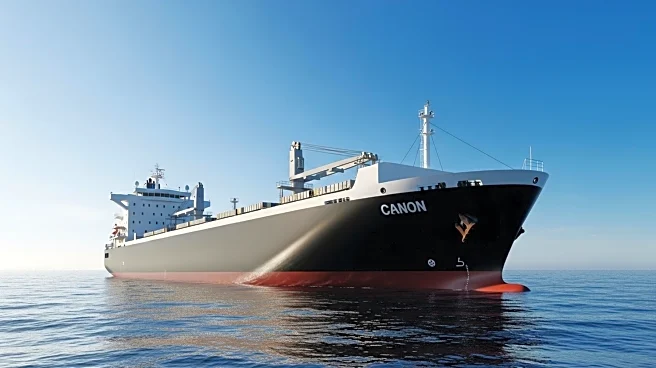What is the story about?
What's Happening?
The second edition of 'Cabotage Laws of the World,' published by SRI and co-authored by Deirdre Fitzpatrick and Emeritus Professor Hilton Staniland, reveals that cabotage laws now exist in 105 countries, up from 91 in 2018. Cabotage, which involves the regulation of maritime transport within a country's borders, has spread across various regions, including West Africa, the Middle East, and the Caribbean. The report highlights the increasing adoption of cabotage laws as countries recognize their strategic importance in safeguarding national supply chains and maritime security. The report also notes that cabotage laws often include provisions for the employment of national seafarers and minimum wage requirements, ensuring fair treatment and competition in the maritime industry.
Why It's Important?
The expansion of cabotage laws underscores their significance in enhancing national security and economic resilience. By regulating domestic maritime transport, countries can better protect their supply chains and ensure the availability of merchant ships during crises or conflicts. The adoption of these laws also supports the employment and training of national seafarers, contributing to the development of a skilled maritime workforce. As geopolitical tensions and global trade dynamics evolve, the strategic implementation of cabotage laws becomes increasingly vital for countries seeking to maintain control over their maritime resources and infrastructure.
What's Next?
As more countries recognize the benefits of cabotage laws, further expansion and refinement of these regulations are expected. Policymakers and industry stakeholders may continue to explore ways to enhance the effectiveness of cabotage laws in protecting national interests and supporting the maritime industry. The report serves as a valuable resource for governments and unions as they work to strengthen protections for seafarers and ensure fair competition in the maritime sector. Ongoing discussions and collaborations among international maritime organizations may lead to the development of best practices and strategies for implementing cabotage laws globally.
Beyond the Headlines
The growing adoption of cabotage laws reflects broader trends in global trade and security. As countries prioritize the protection of their maritime resources, the role of cabotage in national policy is likely to expand. This shift may influence international trade agreements and maritime regulations, as countries seek to balance open markets with the need for strategic control over their shipping industries. The emphasis on national seafarer employment and training also highlights the importance of developing a sustainable and skilled maritime workforce to support future economic growth and security.















